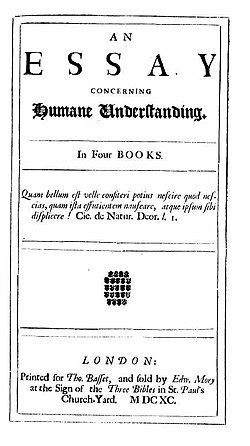An Essay Concerning Humane Understanding
An Essay Concerning Humane Understanding , German A treatise on the human mind by the English philosopher John Locke , first published in London in 1690, became the classic title of empirical epistemology .
The motto came from Cicero's De natura deorum ( On the essence of the gods ), to be translated as: “ How nice it is to admit your ignorance rather than talk about such things and displease yourself. “Only the following editions noted the author on the title page; from the first issue on, however, there was no secret here; Locke's signature followed the dedication .
Publication history
The essay was first published in December 1689. As usual with late publication dates, the year to come was given as the printing year. From the instant moderate success the series met in 1690 testifies, 1694, 1695, 1700, 1706 and - as part of the complete works - 1714. European influence unfolded with that of Locke himself supervised the French edition Pierre Costes (1668-1747), the first time in 1700 and reissued in 1729. A German edition did not come out until a few decades later under the title Experiment vom Menschen Verstande . Translated from English and annotated by Heinrich Engelhard Poley (Altenburg, 1757).
structure
The starting point for the essay was on the one hand Locke's scholastic training at Oxford on the basis of the nominalism prevailing in England . On the other hand, during his four-year stay in France he had dealt intensively with Descartes and his conception of innate ideas.
Accordingly, in the first book, Locke first examined the origin of the ideas and developed a variety of pragmatic arguments for rejecting native ideas. His basic thesis was: Nihil est in intellectu quod non (prius) fuerit in sensibus ( nothing is in the mind that was not in the senses beforehand ). The second book deals with the relationship between ideas and experience. At birth, human consciousness is a tabula rasa on which experience first writes. The starting point for knowledge is sensual perception. However, Locke was not a sensualist . He distinguished between external perceptions (sensations) and internal perceptions (reflections). The next step in the third book is to examine the role of language, its relationship with ideas, and its significance for knowledge. Finally, book four deals with the complex (summarized) ideas, the limits of knowledge and the relationship between reason and belief. Locke criticizes the exclusive approach of the Ex praecognitis et praeconcessis .
Outputs (examples)
- An Essay Concerning Humane Understanding. London: Printed for Tho. Basset hound Sold by Edw. Mory, 1690
- An Essay Concerning Humane Understanding. Ed. Peter H. Nidditch. Clarendon, Oxford 1975 ISBN 0-19-824386-3
Web links
- Locke, John: An Essay Concerning Humane Understanding. ( Memento of March 9, 2015 in the Internet Archive ) (original text in English)
- German translation from 1872
